The Shell Game, David Toop & Lawrence English (Room 40)
Impossible Worlds, Kevin Daniel Cahill (False Walls)
Halcyon Days, Michael Byron (Cold Blue Music)
Tiny Thunder, Nicholas Chase (Cold Blue Music)
The Basketweave Elegies, Peter Garland (Cold Blue Music)
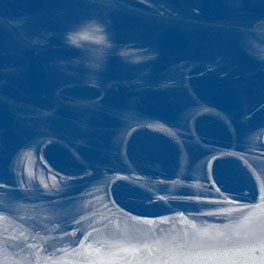
David Toop & Lawrence English’s album starts with ethereal atmospherics, a whistling noise hovering over keyboards and drones, in an almost Tangerine Dream like manner, before slowly shifting into a denser, darker place. The rest of the album inhabits similar territory: this is a resonant, echoing place, full of disjointed textures, distant voices, field recordings and unfathomable details. Call it soundscapes, call it improvisation, call it noise (quiet and careful noise) or perhaps resurrect the abandoned term Isolationism which has now fallen out of current usage. Whatever you call it, this is a intriguing collection of careful and engaging, abstract, visceral music.
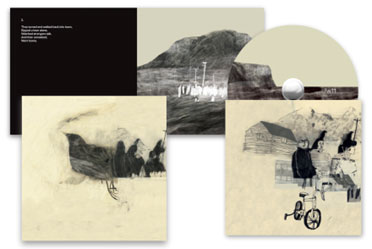
I must offer a shout out to artist Brian McHenry, whose surreal and disjunctive drawings adorn the fold out digipack, inner sleeve and booklet of Impossible Worlds. I’ve also just noticed the False Walls website says that this album is ‘initially ambient and isolationist’, so maybe the term is already back in use. The website details are also how I realised this is a guitar album, although once informed it’s easier to hear the guitar and perhaps place Kevin Daniel Cahill in a loose grouping of other guitarists such as Robert Hampson (recording as Main), even perhaps Richard Pinhas and Robert Fripp, who mostly use guitar as a sound source. (Of course, I could have read the sleeve notes properly…)
Cahill’s album consists a long piece divided into 3 parts, and a briefer second piece. The long first piece is astonishing, a mostly timeless drift with an almost non-existent pulse underpinning it, an ebb and flow of echo and sustain. At times it almost collapses into stasis, just about stands still, before – like the tide turning – the lull ends and new waves of sound gently shimmer and combine together again. ‘Lamentation’ which occupies a larger slab of the long track is, as you might expect, langorous and sad, but it is never completely dark or hopeless. Trails of notes spiral and fade across an emptiness that is full of overtones and expiring sound. I’m less enamoured by the second track which has a kind of choral presence behind itself, diverging, accompanying, and offering sonic variations. I find similar voicings too present in much of today’s ambient work, but you might like it; and the album’s first track is simply stunning.
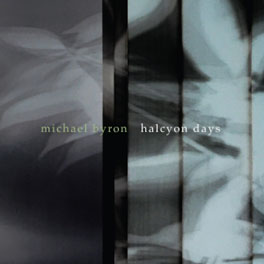
Michael Byron is a mainstay of Cold Blue Music’s wonderful output, and Halcyon Days is a wonderfully slow and meditative collection of music written back in the 1970s but only now recorded and released. ‘Drifting Music’ is a piece for tubular bells, which focusses on the sustain and decay of the bells’ ringing tones for six minutes, whilst the following ‘Music of Every Night’ sees percussionist William Winant move to maracas and marimbas for a piece which starts with the gentle swish and rustle of the former until a couple of minutes in, the marimba’s deep wooden tones arrive, gently meandering and sustaining the piece until it again fades out to reveal the soft shaking percussion beneath.
‘Music of Steady Light’ is a longer piece, with Winant playing an array of percussion. The first part is reminiscent of Philip Glass’ Uakti in tone and minimalist rhythmic interplay (that’s not a complaint), whilst part two goes all metallic and twinkling. The final part seems to reinvent the first but with clearer separation and a sonic clarity that builds in slow tension then slurs and slows to a close. The final two tracks are a four-handed piano piece which sets crashing chords beneath a lighter, higher pitched, faster and slowly evolving part; and a limpid, laconic piano solo, ‘Tender, Infinitely Tender’ which strays into Harold Budd territory. It is a beautiful piece to end this wonderful album.
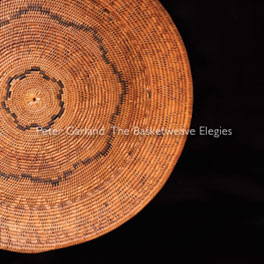
Winant is also the percussionist on Peter Garland’s The Basketweave Elegies, but here he is confined to vibraphone. I have to admit I found the nine short tracks or parts here dynamically and sonically similar, and the album the least interesting of the three new Cold Blue releases. It is too self-absorbed and ‘pure’ for my taste, and mostly reminded me of the sounds of bell ringing, the variation and organization in evidence when a peal is played.
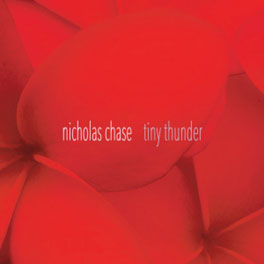
Bryan Pezzone is the pianist on Nicholas Chase’s Tiny Thunder album, which is almost an EP: its two tracks just clock in at over 30 minutes total. ‘Zubwang’ is even sparser than Byron’s ‘Tender, Infinitely Tender’ and perhaps a little warmer in tone, with tiny flurries of activity within its contemplative meander. ‘Tiny Thunder’, the longer piece, is no faster or busier but uses the lower end of the instrument to offer the odd rumble and musical shading. It’s an exquisite release.
Rupert Loydell
